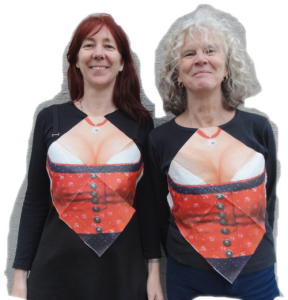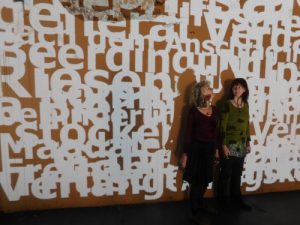 during november & december i’ve been working with annie abrahams on our collaboration “unaussprechbarlich“; we started a few months ago with the research (building on annie’s “estranger” project from the last year or more), around the topic of learning language(s) as an adult to live in a foreign country. the project comprises research, the website, and performances – of which we have now given two work-in-progress presentations. tonight we give the third, and last for this phase of the work.
during november & december i’ve been working with annie abrahams on our collaboration “unaussprechbarlich“; we started a few months ago with the research (building on annie’s “estranger” project from the last year or more), around the topic of learning language(s) as an adult to live in a foreign country. the project comprises research, the website, and performances – of which we have now given two work-in-progress presentations. tonight we give the third, and last for this phase of the work.
it’s been a much more difficult process than we had expected, for a number of reasons. annie and i have worked together since 2008 on various projects: annie invited me to participate in her projects “breaking solitude“, “huis clos/no exit“, “angry women” and the Reading Club; we were both part of the CyPosium organising team in 2012; and during 2013-14 we co-edited CyPosium – the book. annie presented a work at the 121212 UpStage Festival and participated in the UpStage 10th Birthday Celebrations in 2014. that’s quite a lot of online communication and collaboration over almost eight years, so it came as a surprise for both of us that collaboration in physical space is very different. i’ve worked both online and offline with people from all kinds of different creative backgrounds for over 15 years and never had this experience. so we are asking ourselves, what is it that has made it difficult?
there have been a couple of significant practical and environmental challenges, at least for me. first of all, we agreed that we would work as much as possible auf deutsch. we decided that our primary audience, at least for this first phase of the project, is german-speaking – either german people, or people who have moved to germany and learnt or are learning german; so it made sense to speak and write in german, on the website and in the performance. furthermore, i am in the middle of this language-learning process, and that is integral to the project, so by doing everything in german i am living the actual experience and improving my german along the way. which is all very true and good, but i discovered that not only is it very hard and tiring to be immersed in german (to be honest, i was never really completely immersed as i still had english conversations, emails, etc), it is also very limiting creatively. i frequently found myself tongue-tied, unable to express ideas, struggling so much to find words that i could not find anything and my brain ground to a halt. i could not be creative – yet – in german. the more i tried, the harder it felt and the more blocked, stupid and uncreative i became.
a second challenge was that, early on, annie proposed that we perform without computers. i don’t remember now what her reasons were, and i accepted it without much discussion. i had ideas for text projections, webcams and other performative elements involving the computer which i was disappointed not to do, but i also didn’t argue very hard for it. i was taking on the challenge of language immersion so why not also take on the challenge of going without my performance instrument as well? i was open to all proposals, willing to come out from behind the keyboard and explore outside my comfort zone. thus doppel-behindert, without language or instrument, i produced something immature, cliche, false and awkward. in hindsight i could say that it was a mistake, that i should have stuck to what i do best, but perhaps it was a necessary if unpleasant part of the process. finally i admitted defeat, retreated behind the keyboard and reverted to speaking english. yes, i felt like a failure (weichei, warmduscher, schattenparker … ) but it was such a relief! struggling sometimes produces great results, but to struggle unproductively is very depressing and exhausting.
 after our initial presentation at the villa waldberta, we had four days in the proberaum at schwere reiter theater to prepare for our next presentation. i experimented with text projections, my flexible mirror, live webcam images, online translation and pronunciation tools and text editors; all at the computer. i understood that annie’s initial proposal not to use computers was the right thing for her, but not for me. we rearranged our material, developed different ways to present elements and found creative solutions to most of the problems. there were still difficulties, however the pressure of the next performance only a few days away meant that we didn’t waste time analysing and in general it felt that we were working better. we were satisfied with our next performance and had a good response from the audience, although the structure of the evening meant that we lost the opportunity to have a discussion afterwards on the themes of the work.
after our initial presentation at the villa waldberta, we had four days in the proberaum at schwere reiter theater to prepare for our next presentation. i experimented with text projections, my flexible mirror, live webcam images, online translation and pronunciation tools and text editors; all at the computer. i understood that annie’s initial proposal not to use computers was the right thing for her, but not for me. we rearranged our material, developed different ways to present elements and found creative solutions to most of the problems. there were still difficulties, however the pressure of the next performance only a few days away meant that we didn’t waste time analysing and in general it felt that we were working better. we were satisfied with our next performance and had a good response from the audience, although the structure of the evening meant that we lost the opportunity to have a discussion afterwards on the themes of the work.
now, as we prepare for the last presentation in this phase of the project, we’re starting to be able to reflect on the overall process and what has made it so difficult. annie has written this post, including some response from me, i’m writing this post that you’re reading now, and we’re discussing together and via email. what we understand is that we have fundamentally different working processes: annie likes to think things through and not try out or rehearse, so as to be new every time and not completely controlled. i’m pretty much the opposite: i need to try things out in order to see if they work or not, and to discover new possibilities; then i rehearse and repeat in order to be able to do things smoothly without thinking. (which is interesting for another reason, as during the course of this project i identified that one of the things i don’t like about learning languages is the repetition – having to repeat things over and over again to learn by heart. rote learning is boring – but rehearsing for a performance is not.) i might have recognised our differences earlier in the process, if i hadn’t been so stuck and behindered by language. now, i’m curious about whether our processes are the same online or not, and what difference that makes to how we work together.